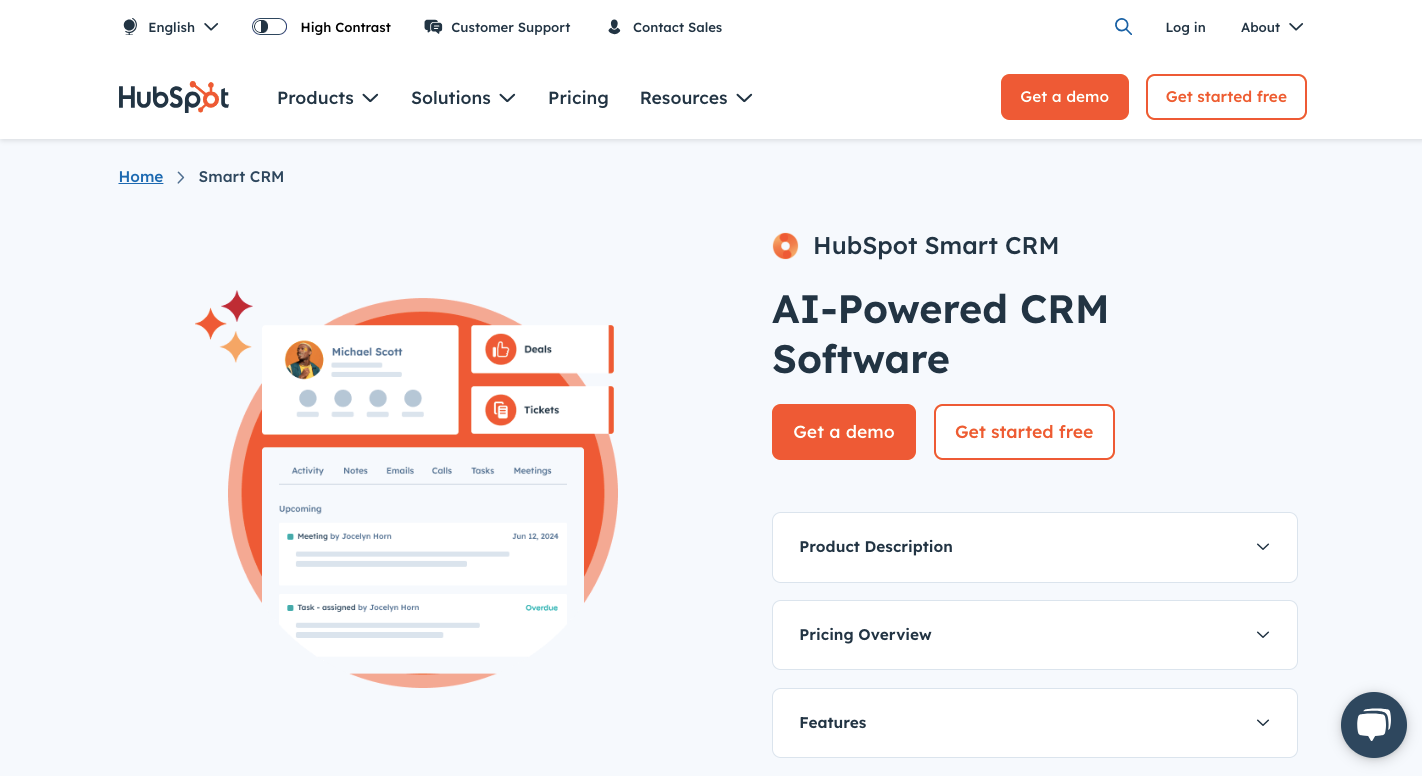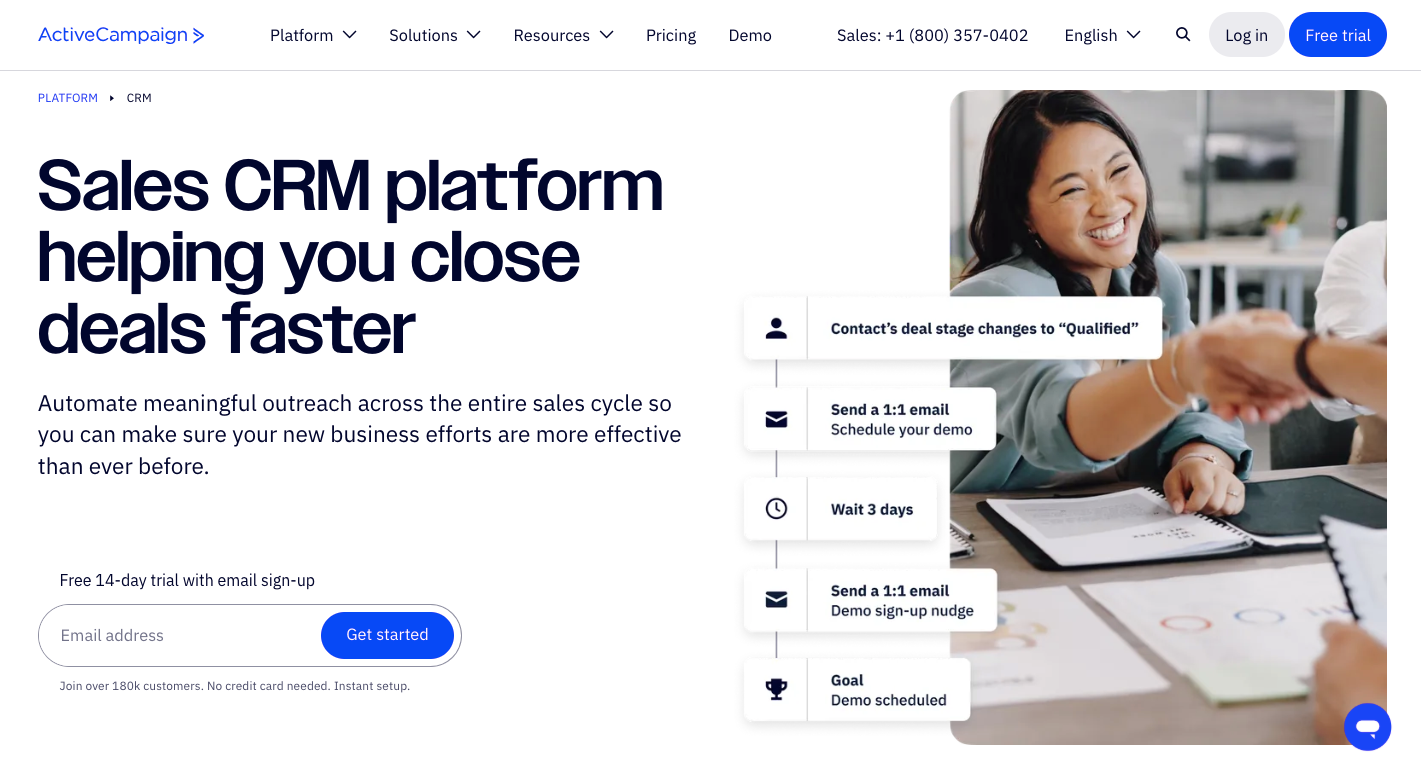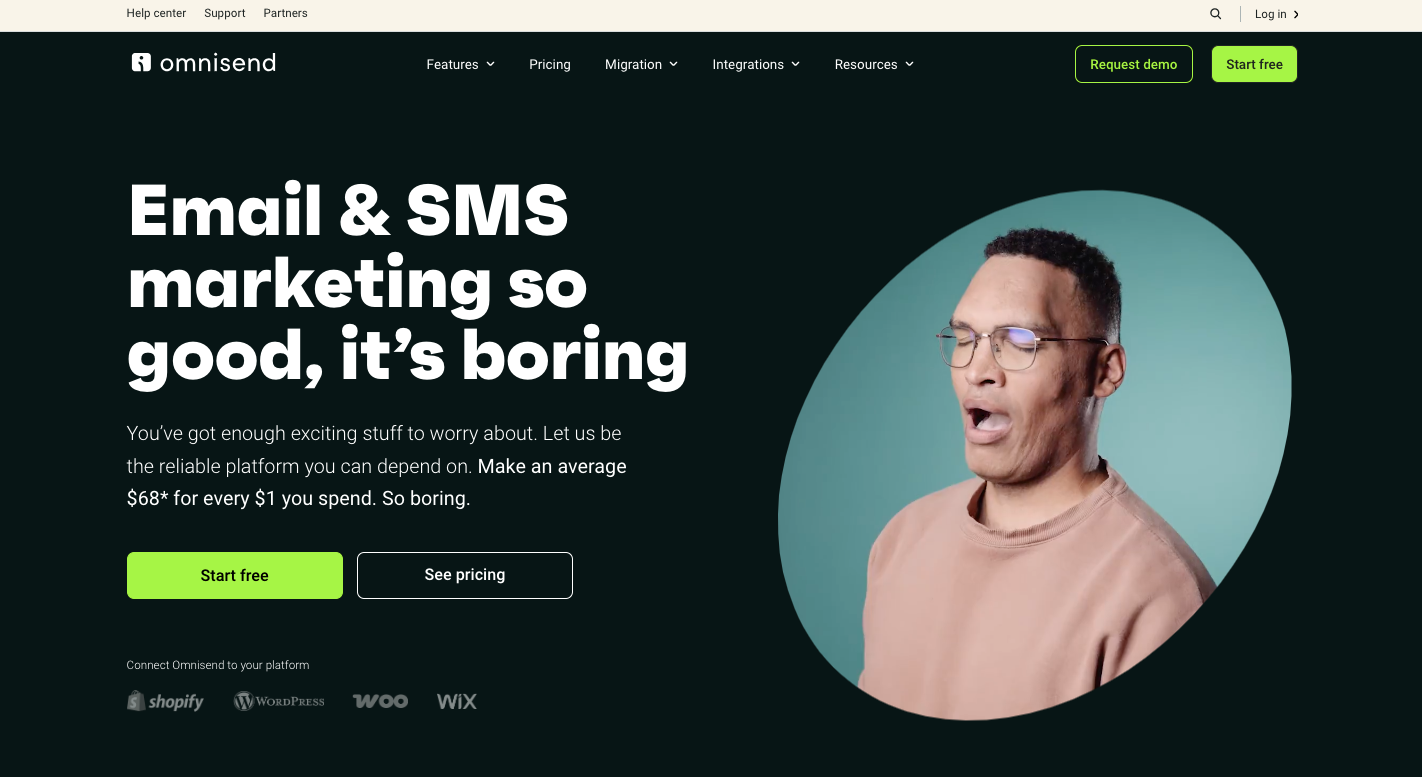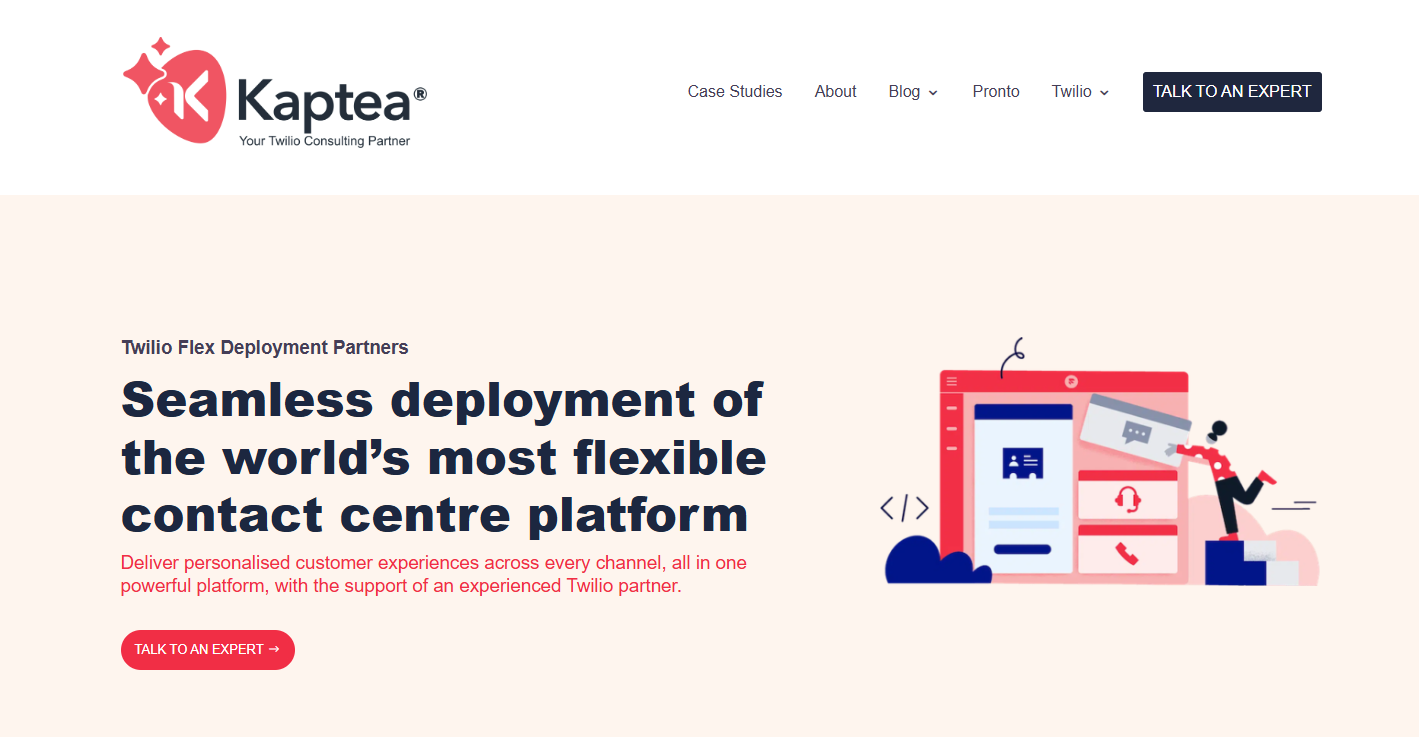
[et_pb_section][et_pb_row][et_pb_column type="4_4"][et_pb_text]Omnichannel CRM platforms have become a must for companies that deal with customers on multiple channels.As users move between email, chat, phone, and messaging apps, they expect companies to stay in sync and respond quickly. It’s no longer enough to just store contact details.Businesses now need tools that track customer behavior, support consistent messaging, and offer timely service across different touchpoints.That’s where the right platform comes in. It helps manage customer interactions, support agents, and marketing efforts in one place.In this article, you will learn how omnichannel CRMs help with service, sales, and marketing. You’ll also get a full breakdown of the best options to consider in 2025.
An omnichannel CRM is a system that brings together sales, marketing, and support into one connected platform. It combines all customer interactions from email, chat, phone, SMS, and social media into a single timeline.Unlike multichannel customer support, where each channel operates independently, an omnichannel CRM links everything in one place. A customer might start with a chat, follow up through email, and then call later.With this system, every step is tracked as one ongoing interaction, not separate conversations. That means no repeated questions, less frustration, and faster resolutions.Many omnichannel CRMs include or integrate with essential tools such as:
With an omnichannel CRM, businesses can shift from managing channels to managing relationships. It allows you to act on real-time information, reduce delays, and deliver support that feels consistent and personal, no matter how or where the customer reaches out.
The right omnichannel platform connects your support, sales, and marketing teams while keeping every message clear and consistent.The tools below help manage tasks, track performance, and provide real-time help across multiple communication channels.

Image Source: salesforce.com
Salesforce is a full CRM system that supports sales, marketing, and service teams on a shared platform. It helps you track contacts, manage leads, send email marketing campaigns, and monitor support cases.The system gives a clear view of customer interactions, from first touch to repeat sales, to help teams make smarter decisions.Some of Salesforce’s key features, such as built-in reporting tools and real-time insights, offer marketing tools that allow teams to run campaigns that match actual customer needs.Service teams further benefit from case tracking, service-level agreements, and options for self-service support.With Slack integration, internal updates flow smoothly. The AppExchange also provides access to thousands of apps that extend the platform’s core functions.
Salesforce Service Cloud offers several editions to suit different business needs. The Starter Suite begins at $25 per user per month, providing basic CRM functionalities. The Pro Suite is priced at $100 per user per month.The Enterprise edition, which includes built-in AI capabilities, starts at $165 per user per month. For comprehensive services with 24/7 support, the Unlimited edition is available at $330 per user per month.Additionally, the Einstein 1 Service edition, offering advanced AI and data features, is priced at $500 per user per month.

Image Source: hubspot.com
HubSpot CRM offers a simple interface with strong support tools built into its platform. It includes a shared inbox to track customer emails, ticket management to assign requests, and automation tools to speed up follow-ups.The platform connects to multiple communication channels, which gives agents access to chat, email, and form requests in one place. You can also collect customer opinions through built-in survey tools and track trends with clear analytics.For teams already using HubSpot for marketing efforts, the CRM connects smoothly with its other tools. It makes it easier to run targeted outreach and respond based on live customer data.The knowledge base and live chat features also support self-service, reducing the load on your agents.
The Professional Customer Platform starts at $1,300 per month, while the Enterprise Customer Platform begins at $4,700 per month.

Image Source: freshworks.com
Freshworks CRM or Freshsales comes with tools for ticket handling, a searchable knowledge base, and a public forum where users can find or share answers.It supports multiple communication channels and comes with built-in reports to monitor performance. AI features help route messages, recommend follow-ups, and track lead activity.The CRM is especially popular with teams that value a user-friendly interface and want basic support tools without extra complexity.
The Growth plan starts at $11 per user monthly, the Pro plan starts at $47 per user, and the Enterprise plan starts at $71 per user.

Image Source: zendesk.com
Zendesk Sell is a focused CRM system that improves how sales teams manage leads and track progress. It provides a clear view of contact data, deal stages, and team activity through customizable dashboards.Each user can adjust their view with drag-and-drop widgets to monitor performance, upcoming tasks, and sales goals in real time. The built-in task player helps agents stay on track by showing the full context of each lead or account as they work through their day.The platform also offers pipeline analysis tools that help teams spot problems early. With visibility into every stage of the deal flow, you can see where delays happen and take quick action.Reporting tools also deliver insight into volume, speed, and conversion rates to improve your process and results.
Zendesk Sell’s Team plan starts at $19 per agent per month, the Growth plan starts at $55, and the Professional plan starts at $115.

Image Source: activecampaign.com
ActiveCampaign CRM is for sales teams that want to move quickly, stay organized, and focus on leads with the highest potential. It brings automation and data tracking into one organized platform.The platform includes hundreds of automation templates that cover common tasks like follow-ups, email sequences, and pipeline updates. ActiveCampaign’s visual editor makes it easy to adjust workflows, even for teams new to automation.Sales reps can also use site tracking to monitor what leads do online to have better insight into timing and interest. Lead scoring helps teams sort prospects by behavior so no one wastes time chasing cold leads.With over 900 software integrations, the platform fits into just about any setup, which makes data-sharing across teams smooth.
The Starter plan begins at $15 per month, Plus starts at $49, Pro at $79, and Enterprise at $145 per month.

Image Source: klaviyo.com
Klaviyo offers omnichannel customer service for e-commerce businesses looking to manage campaigns across email, SMS, and push notifications.It supports multiple languages and currencies and works well for brands that need international reach. With 300+ integrations, it connects smoothly to e-commerce platforms, shipping tools, and loyalty programs.You can use ready-made templates for fast campaign setup, while built-in AI helps choose the best time to send messages based on behavior.Its reporting dashboard gives a full view of campaign results, and users can track which channel drove a sale using multichannel attribution.The platform also follows privacy rules like GDPR and CCPA, making it a strong option for businesses with strict compliance needs.
Klaviyo offers a free plan, but it is limited to 250 active profiles. Paid email plans start at $45 per month, and the email plus SMS option starts at $60 per month.

Image Source: omnisend.com
Omnisend is a full-service omnichannel marketing platform that supports email, SMS, push notifications, WhatsApp, pop-ups, and dynamic ads on Facebook and Google.You can launch campaigns quickly with built-in templates and use AI to write emails, predict actions, and review performance. It also supports API access to manage customer data and integrates with over 130 platforms, including top CRMs and online stores.The platform’s reporting gives insight into revenue and audience engagement across various marketing channels while staying compliant with major privacy laws like GDPR, CCPA, and TCPA.For contacts who miss a campaign the first time, the Campaign Booster tool can resend messages automatically.
The Standard plan starts at $11.20 per month, and the Pro plan starts at $41.30 per month.
Below are the main benefits you can expect when you use one platform for all customer interactions.
An omnichannel CRM system supports every step of the customer experience, from first contact to post-sale support.When someone sends a message on chat, replies to an email, or calls your team, the platform captures and connects each touchpoint. It creates a consistent thread across multiple communication channels.People prefer different ways to reach out. Some use email for product questions. Others use chat for delivery updates or social apps to raise concerns. When each of these channels is connected in one place, teams can respond faster and with more context.The result is a better overall experience. Customers don’t need to repeat themselves, and agents don’t waste time searching for details. This reduces confusion, builds trust, and keeps conversations on track.As a result, businesses improve both customer satisfaction and long-term customer engagement.
Responding to simple requests over and over wastes time. An omnichannel CRM solves it by handling everyday tasks automatically. It can send order updates, assign tickets to the right team, or flag urgent messages without manual input.Because the system connects across multiple communication channels, it knows where the message came from and what to do next.A chat request gets one type of follow-up, while an email might trigger something else. This smart routing speeds up response time and keeps teams focused on work that needs human input.Over time, automation improves consistency. Customers get timely replies, and no messages fall through the cracks. It helps you move faster and deliver a more reliable customer service experience without hiring more support agents.
Every message, click, or purchase tells you something about your customers. An omnichannel CRM brings all of this data into one place.You don’t need to switch tools or dig through scattered records. Everything is tracked, sorted, and ready to use.For example, you can see which channels a person uses most, what questions come up before a sale, or when support issues tend to happen. By making customer behavior easy to read, the system helps improve customer service strategy and respond smarter.It also supports better targeting. You can send the right message at the right time, avoid repeated offers, and suggest help based on past actions.Instead of guessing what someone might want, your team can act on what the data shows.
People expect e-commerce businesses to know who they are and what they need. An omnichannel CRM makes that possible.When someone reaches out, the system shows past orders, open tickets, and marketing activity. It helps teams give accurate answers and relevant offers without delay.The ability to deliver personalized support across multiple channels is no longer a nice-to-have. People expect it.When you meet that expectation, trust grows. When you miss it, customers often leave. A smart CRM makes personalization simple across every contact point.
In many companies, sales and marketing teams work with different tools and speak in different tones, which can confuse customers.An omnichannel CRM solves that by giving both teams access to the same data and message history.Marketing can see what leads responded to in past campaigns, and sales can follow up with the same tone and timing, which keeps messages aligned and relevant. It also avoids overloading customers with too many emails or calls from different people.Because the platform connects to multiple channels, the message stays consistent and offers a unified customer experience from first contact to final sale.
As your business adds new tools or reaches new markets, you shouldn’t have to rebuild your system every time. A strong omnichannel CRM lets you scale without starting over.It holds your data, workflows, and rules in one place, so you can plug in new channels or teams without breaking what already works.Adding SMS marketing or social support? The system can absorb that without reworking your entire setup. Opening a new product line? You can create matching campaigns using the same structure already in place.This kind of flexibility helps companies grow faster and adjust to new demands. You don’t waste time rebuilding systems.Instead, you add layers to the one you already trust. That saves effort, reduces mistakes, and keeps your customer experience consistent across all touchpoints.
When choosing an omnichannel CRM, make sure it fits both your current setup and your long-term goals. Here are the main things to check:
For companies already using a CRM, Twilio makes it better. It adds communication features like SMS, voice, and WhatsApp into your workflows.Tools like Twilio Flex give you a contact center you can shape to your needs, while Twilio Engage helps you coordinate marketing across channels using real-time customer data.But Twilio isn’t plug-and-play. It takes proper design, smart integration, and a team that knows how to bring the moving parts together.That’s where Kaptea comes in.We build and manage Twilio-based communication systems that reflect how your business actually runs.

With Kaptea, you get:
You don’t need more tools. You need a system that connects what you already have without creating more problems.Talk to a Kaptea expert and start building a support experience that holds up when it matters.
The best omnichannel tool depends on your business needs, but platforms like Twilio, Salesforce, and HubSpot are widely recognized for their ability to connect communication channels and integrate with existing systems. Twilio stands out for its flexible messaging infrastructure, while Salesforce and HubSpot provide deeper CRM integration and unified customer views.
Salesforce is the number one CRM in the world. It leads the global market with a large user base, broad feature set, and strong ecosystem of integrations across sales, service, marketing, and analytics.
An omnichannel CRM is a system that connects customer interactions across email, chat, phone, social media, and other channels in one place. It gives teams a single view of the customer, helping them provide consistent and informed support, marketing, and sales experiences.
The 4 C’s of omnichannel are consistency, convenience, context, and customer data. These principles guide how businesses should design and manage cross-channel customer experiences so that every interaction is seamless and relevant.[/et_pb_text][/et_pb_column][/et_pb_row][/et_pb_section]